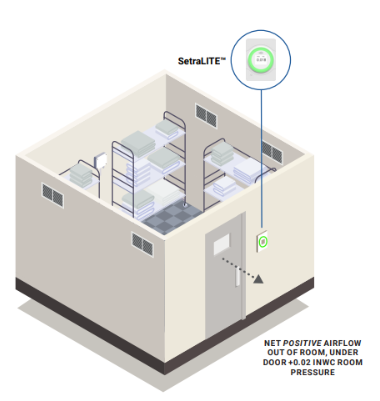This case study will explain how a prominent hospital in Southern California successfully improved compliance adherence, patient safety, and hospital efficiency while also seeing significant cost savings by automating room pressure monitoring in critical areas.
Customer Application & Challenges: Inefficient and Risky Manual Room Pressure Monitoring in a Large Healthcare Facility
In our study, our featured hospital in Southern California faced a critical challenge in maintaining precise pressure levels in crucial areas, including operating rooms, isolation rooms, and specialized care units. Accurate room pressure control is vital to prevent the spread of contaminants and ensure optimal patient safety. However, the existing manual monitoring process required staff members to conduct daily walks throughout the facility to record pressure levels in over 70 critical areas. This labor-intensive approach not only posed inefficiencies but also raised safety concerns due to the potential for mis-recordings, missed readings, and the lack of continuous pressure monitoring. To comply with healthcare regulations and enhance patient safety, the hospital sought a solution that would replace manual monitoring practices while maintaining the highest standards of accuracy and well-being for their patients.

Solution: Automated and Continuous Pressure Monitoring to achieve ASHRAE compliance
To address these challenges, the hospital implemented an automated room pressure monitoring system: Setra LITE Room Pressure Monitor.
By integrating Setra LITE, the facility achieved these improvements:
$23,386.54 in Cost Savings: The implementation of Setra LITE resulted in the financial resources becoming available that could then be strategically reinvested to further improve patient care and facility operations.
Streamlined Operations: The automated system replaced the manual monitoring process, saving valuable staff time and allowing them to focus on more critical tasks. This enhanced workflow efficiency and resource allocation, especially crucial in the context of staffing shortages faced by many healthcare facilities.
Continuous Monitoring: With Setra LITE's continuous pressure readings, the hospital ensured that critical areas consistently maintained the necessary pressure levels. This real-time data facilitated prompt response to pressure deviations, mitigating the risk of contaminants spreading and reinforcing patient safety.
The successful application of automated room pressure monitoring yielded numerous benefits, including:
-
Regulatory Compliance: The automated system assisted the hospital in meeting ASHRAE and other regulatory requirements, reducing the burden of falling out of compliance. This proactive approach facilitated smoother regulatory audits, allowing staff to allocate more time to patient care rather than paperwork and corrective measures.
Financial Savings: The significant cost savings resulting from the implementation of Setra LITE allowed the hospital to better allocate resources. Funds were channeled into streamlining administrative processes, reducing administrative overhead, and ensuring that the medical staff could focus less on time-consuming manual pressure checks.
Proactive Safety and Efficiency: The continuous pressure monitoring powered by Setra LITE enhanced both patient safety and operational efficiency. With automated alerts for pressure deviations, medical staff now proactively addresses potential issues, ensuring a secure environment for patients while simultaneously minimizing disruptions and optimizing resource utilization.
The Californian hospital's transition from manual to automated pressure monitoring signifies a paradigm shift in healthcare management. The adoption of automated systems like Setra LITE reflects a commitment to improving patient safety through meticulous oversight. This transition goes beyond just efficiency gains; it ushers in a phase where compliance with regulations is seamlessly integrated into easy-to-use equipment and economic resources are optimized. The move towards automation is more than a convenience – it's a testament to the hospital's dedication to delivering precision and reliability.
